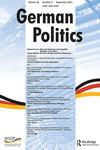The Art of Compromise: Belgium as the Bridge between Germany and France
IF 2.1
3区 社会学
Q2 POLITICAL SCIENCE
引用次数: 1
Abstract
This contribution applies the theoretical framework developed by Schoeller and Falkner (this issue) to the case of Belgium. First, it examines Belgium’s preferences and the status quo before and after the financial crisis, juxtaposed against Germany’s preferred outcomes. Belgium has traditionally favoured more integration, leading to Belgium’s strategy of co-shaping and pace-setting in regards to monetary integration through persuasion, cultivating alliances, and brokering compromises that satisfied Germany’s interests in EMU versus those of the European Commission and France. The global financial crisis changed Belgium’s strategy, as it became constrained by the effects of the crisis on its economy and the domestic political turmoil that ensued. Belgium went from a pre-crisis pace-setter to a fence-sitter, relying on the persuasion of its allies to convince Germany to agree to reform the architecture of euro area governance. Finally, this contribution considers the institutional fabric of Belgium’s relation to the hegemon. This is relatively weak between Belgium and Germany, making multilateral settings the preferred forum rather than bilateral. Nevertheless, Belgium’s famous capacity for forging compromises among disparate interests was demonstrated through the diplomacy of former Belgian Prime Minister Herman Van Rompuy as the European Council’s first full-time president.妥协的艺术:比利时作为德国和法国之间的桥梁
这一贡献将Schoeller和Falkner(本期)提出的理论框架应用于比利时的案例。首先,它考察了比利时在金融危机前后的偏好和现状,并与德国的偏好结果进行了对比。比利时传统上倾向于更多的一体化,这导致比利时在货币一体化方面采取了共同塑造和设定步伐的战略,通过说服、培养联盟和促成妥协来满足德国在欧洲货币联盟中与欧盟委员会和法国的利益。全球金融危机改变了比利时的战略,因为它受到危机对其经济的影响和随之而来的国内政治动荡的制约。比利时从危机前的领跑者变成了骑墙者,依靠盟友的说服说服德国同意改革欧元区治理架构。最后,这一贡献考虑了比利时与霸主关系的制度结构。这在比利时和德国之间相对较弱,使多边环境成为首选论坛,而不是双边论坛。尽管如此,比利时前首相赫尔曼·范龙佩作为欧洲理事会首位全职主席的外交表现出了比利时在不同利益之间达成妥协的著名能力。
本文章由计算机程序翻译,如有差异,请以英文原文为准。
求助全文
约1分钟内获得全文
求助全文

 求助内容:
求助内容: 应助结果提醒方式:
应助结果提醒方式:


